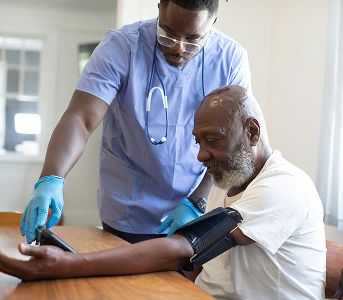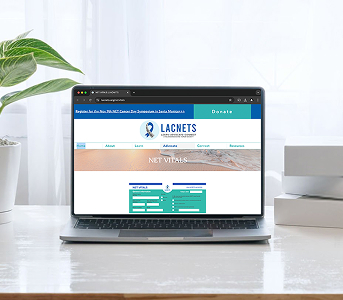Participate in a clinical trial
Clinical trials can provide patients with innovative treatments. Use the clinical trial finder tool to help you find personalized trial options.

Having a strong support system is important when living with a rare disease. Many organizations offer support, education, and resources for those living with NETs and their care partners.

Clinical trials can provide patients with innovative treatments. Use the clinical trial finder tool to help you find personalized trial options.

The NET journey is different for everyone, and keeping track of your journey isn’t always simple to do. The LACNETS Vital Information Tracking Document is a useful place to record symptoms, doctor’s visits, treatments you’ve received, and other important information. Having all the details in one place can help you understand your situation and have better discussions with your health care team.

Whether you're newly diagnosed or deciding on your next steps, it helps to find a care team that understands NETs and with whom you feel comfortable talking about your disease.
Ways to find a care team:

Find out where Detectnet is available near you.


Detectnet™ (copper Cu 64 dotatate injection) is intended for use with a positron emission tomography (PET) scan. It helps to identify certain types of tumors, called neuroendocrine tumors (NETs), in adult patients.
This is not a complete report of risk information for Detectnet. Please speak to your healthcare provider or pharmacist to learn more about Detectnet and see full Prescribing Information or visit Detectnet.com.
When radioactive drugs like Detectnet are used to help doctors find disease, they expose patients to radiation. Long-term exposure to radiation is associated with an increased risk of cancer. Your healthcare provider will take safety measures to reduce your exposure to radiation. To help your body get rid of the radiation from Detectnet, you should drink plenty of fluids both before and after receiving it, and urinate often after your scan.
After using Detectnet, some patients reported getting a rash or itchy skin. They usually went away on their own or with normal care. Less commonly, patients had swelling under the skin or another serious, life-threatening, allergic reaction.
Detectnet works by attaching to NETs, which helps the tumors to be seen in your scan. However, there are other types of tumors or normal variations in tissue that Detectnet can also attach to. That means that it’s possible your healthcare provider may see things in your scan that are not necessarily NETs. Also, if you’ve never had a NET before, a negative result—when your healthcare provider sees no NETs—does not guarantee that you do not, or will not, have NETs.
In trials of Detectnet, participants experienced few negative side effects. Adverse reactions occurred at a rate of less than 2% and included nausea, vomiting, and flushing (getting red in the face). In some trials, people felt nauseated right after Detectnet was injected.
Tell your healthcare provider if you are taking any other medications. Somatostatin analogs may affect how Detectnet works. You should stop taking long-acting somatostatin analogs at least 28 days before your Detectnet scan. You should stop taking short-acting somatostatin analogs 2 days before your Detectnet scan.
All radioactive drugs, like Detectnet, can be dangerous to an unborn baby. Be sure to tell your healthcare provider if you are (or could be) pregnant so that you can discuss the risks and benefits of using Detectnet.
If you’re breastfeeding your child, consider pumping and saving breast milk before you have your scan performed. You should not breastfeed for 12 hours after you receive Detectnet. During those 12 hours, bottle-feed using formula or saved breast milk.
It is not known if Detectnet is safe and effective in patients under 18 years of age.
There were not enough trial participants over age 65 to determine if Detectnet works differently in older patients, but other reports have not found differences between the way older and younger patients respond to it. If you are over age 65, your healthcare provider will take your age, overall health, and other medications into consideration before using Detectnet as part of your scan.
If your healthcare provider thinks you may have had an overdose of radiation, they will encourage you to drink more fluids and urinate more often to help your body get rid of the radiation exposure. They may also suggest that you take a diuretic (a medicine that increases your body’s production of urine).
You are encouraged to report negative side effects of prescription drugs to the FDA. Visit www.fda.gov/medwatch or call 1-800-FDA-1088.
Back to Top